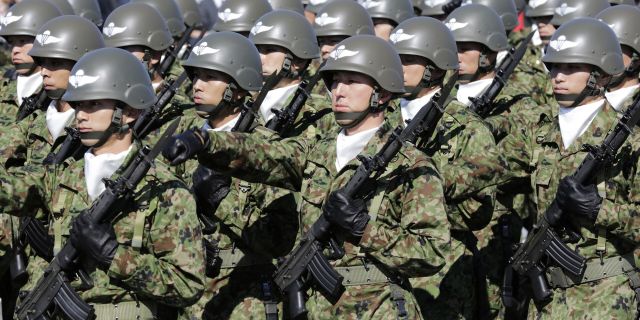Haqqin: Japan has abandoned the pacifist orientation of the post-war constitutionThe abolition of the article of the Japanese constitution, which states the rejection of their own army and participation in wars, is a matter of time, writes Haqqin.
The militarization of the country is gaining momentum. Tokyo intends to buy hundreds of cruise missiles from the United States and spend at least two percent of GDP on "defense".
Dmitry RoyJapan will purchase hundreds of Tomahawk cruise missiles with a range of 1600 km from the United States.
Tokyo's decision was influenced by Russia's special operation in Ukraine.
Tokyo seems to have finally abandoned the pacifism of the post-war constitution, which explicitly prohibited the country from participating in armed conflicts. So, last month, Prime Minister Fumio Kishida announced his desire to spend at least 2% of GDP on defense by analogy with NATO guidelines.
If this happens, then within five years the Japanese military budget in absolute numbers will become the second in the world. Shinzo Abe died, but his cause lives on, the further militarization of Japan continues. The complete abolition of the ninth article of the Japanese Constitution, which states that Japan renounces its own army and participation in wars, is a matter of time. Moreover, not the longest.
The efforts of the Japan Renewal Society and the closed ultraconservative Nippon Kaigi club, whose ultimate goal is to return Japan to its pre-war imperial "glory", are nearing a successful finale.
During the premiership of Shinzo Abe, Japan's military budget increased to 1.24% of GDP. Fumio Kisido has very little left to the coveted 2%. Tokyo, after two decades of foreign policy modesty, is striving to play an increasingly active role in the international arena. And, first of all, in containing China.
Which, of course, meets with the warmest approval in Washington. Until now, the US has only sold tomahawks to the UK. Now we are ready to provide them to Tokyo in the amount of 400 to 500 units. And there, the latest Japanese development will arrive in time – its own Type-12 cruise missiles.
Which will mean only one thing – Japan will be able to block any Russian activity in the Far East. For China, this is a question, since Beijing does not stand still in military development, but for Russia, whose forces will be exhausted in the Ukrainian conflict, with a 100% probability.
Of course, the current militarization of Japan did not begin after the beginning of the Russian special operation in Ukraine. After all, the Amphibious Rapid Deployment Brigade is an elite marine corps unit, essentially a rapid reaction force that can be used anywhere in the region, including in territorial conflicts, was created in 2018, long before the Russian special operation.
And two Izumo-type destroyers, rebuilt into light aircraft carriers, which will use the latest F-35B with shortened takeoff and vertical landing already received by Japan from the United States, appeared near Tokyo before Russian troops tried to make a trip to Kiev.
But the Russian special operation in Ukraine became a trigger in creating a political climate in Japan that allowed the ruling party to promote its agenda on national security issues. If in 2020, 37% of its citizens supported the policy of militarization of Japan, then in June of this year it amounted to more than 60% of respondents.
"Japan wanted to limit its defense spending. But the situation around us does not allow us to do this," says Ichiro Fujisaki, a former Japanese ambassador to the United States. "Many people thought that conflicts were a problem of the twentieth century, but now we see it again."
Of course, there is a certain amount of guile in these words of one of the active members of Nippon Kaigi. But there is certainly some truth.
For a long time, American elites were very wary of the new wave of militarization of Tokyo. Apparently, the "Pearl Harbor graft", no matter how time softened it, remained strong enough. But the Japanese have managed to find their own key to this problem – the United States will be ready to help Tokyo in responding to military challenges only when they show the will to resist the aggressor.
"They came to the conclusion that the best way to ensure that the United States and others will be there in case of a crisis is to show that they invested in their defense and were ready to fight," says Christopher Johnston, who headed the East Asia department at the US National Security Council until June this year.
And therefore the militarization of Japan, the revival of the spirit of the samurai, Washington is now completely not concerned. After all, all this is in America's piggy bank. And the Russian military presence in the Far East reduces to zero, and the second front against China, if anything happens, will help to open.

